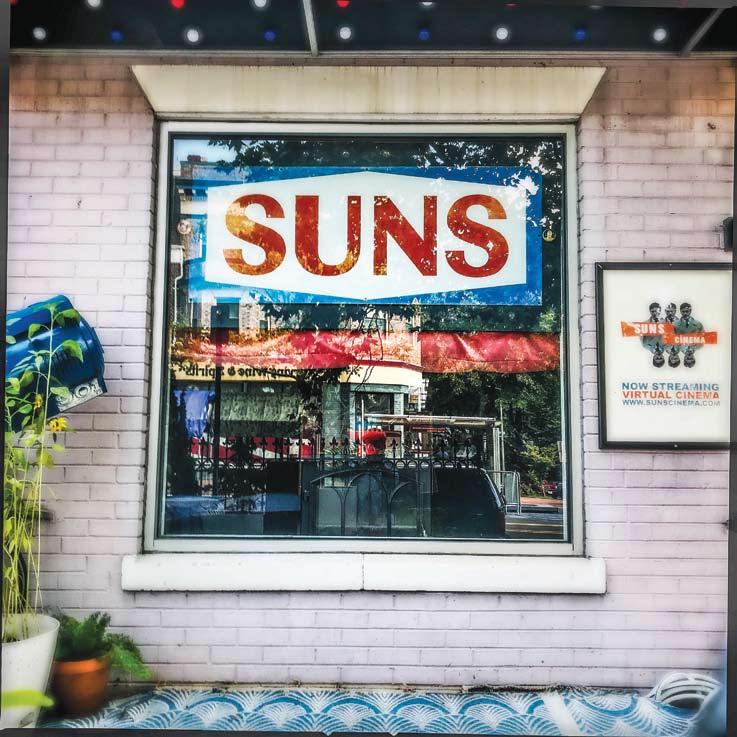
8 minute read
ARTS
Cinematic Universe
Avalon Theatre, Suns Cinema, and AFI Silver are brimming with films you can stream from home. They could use your support.
Advertisement
By Ella Feldman
@EllaMFeld It took about a day for Avalon Theatre’s director of programming Andrew Mencher to begin transforming the Chevy Chase independent art house cinema on Connecticut Avenue NW into a virtual theater.
On Friday, March 13, the Avalon began showing the indie comedy Saint Frances. The
next day, Mencher and his team decided to close the theater in light of the novel coronavirus pandemic, and he was immediately on the phone with a member of the distribution company—the people in charge of releasing and marketing a film—for Saint Frances. By the following Tuesday, they had figured out a way to offer the film virtually.
“I didn’t want to lose the opportunity of having just opened up a terrific little independent film, and I understood that we could be able to find a way to do this, to really rescue that film,” Mencher says. “I was definitely looking more at that one film in particular initially.”
But Mencher’s thinking changed rapidly, as it became clearer minute by minute that movie theaters (which, of course, have built their entire business model around packing dozens of strangers into an indoor space, a nightmare by today’s public health standards) might be closed for a very long time. He wasn’t alone. Throughout that week, film distributors and independent theaters across the country began figuring out how to bring their movies into people’s living rooms.
Their solution: En masse, small movie theaters have transformed their websites into virtual cinemas, where viewers can browse through a list of movies being shown, choose a film, then click a link. That link will take them to an external streaming site like Vimeo or Eventive, where they can pay $12 or so directly to the film’s distributor and access the movie for a number of days.
The move to streaming films in this way has presented a mixed bag of advantages and challenges to independent theaters in the District, such as the Avalon, Mount Pleasant’s quaint and beloved Suns Cinema, which is in a rowhouse and doubles as a bar, and the AFI Silver Theatre and Cultural Center in Silver Spring. Virtual cinemas allow theaters to screen more films at once, keep them showing for a longer time, and bring them to audiences who might not be able to make it to their physical establishments. But the pool of films programmers can choose from has changed considerably, making it harder for them to uphold their ethos in their selections. And financially, the switch has changed their business models entirely, and made them a lot less money.
David Cabrera co-founded Suns Cinema with business partner Ryan Hunter Mitchell in 2016, housing it in a Mount Pleasant Street NW property that used to be a cellphone store. In the four years since, the art house theater has become a neighborhood favorite for grabbing a drink and watching its eclectic lineup of films, which are organized into monthly themes such as “Outrageous and Unacceptable”—that lineup included the Kenyan drama Rafiki and cult favorite Beyond the Valley of the Dolls. The space at Suns is small, and feels more like a living room than a traditional theater. “Our business model was packing people into a really small room, and that was very novel,” says Cabrera, who serves as program director. “It’s terrifying now.”
Since going virtual, the pool of movies Cabrera can choose from to put together Suns’ lineup has changed entirely, and shrunken greatly. Like almost everyone else in the industry, he’s limited to the films that distribution companies themselves choose to stream, rather than being able to curate a unique program and secure screening rights independently.
“We prided ourselves on doing these themed months, where we would try to run the gamut very broadly of what we were showing— from old stuff to new stuff, weird stuff, stuff everyone knows,” Cabrera says. “Right now, we get to pick and choose from what’s available to us and to everyone, which is not quite the same as the broad spectrum of cinema that we were allowed to put out before.”
Some of what makes Suns unique has been lost with those limits, Cabrera says, but the new system has also allowed them to become
something they weren’t before: a first-run theater, meaning their virtual cinema gets to show movies as they’re released. They also have the opportunity to hold interesting films for longer periods of time, which they don’t normally get to do. “People have a lot more freedom to kind of watch things when they want,” Cabrera says.
Over in Silver Spring, AFI Silver’s administrative assistant Brenna Davis says going virtual has allowed the theater, which is run by the American Film Institute, to give more exposure to its selection of independent films, especially international films. This fall, Davis and her team will be taking that exposure a step further by bringing its annual Latin American Film Festival online with Eventive, which they also used earlier in the year for AFI DOCS. Tickets will still be capped, as the festival is a venue for many films to run for the first time, but Davis hopes the switch will allow for a wider variety of people to watch the lineup, which will include 20 movies from a variety of Latin American countries. She says many of the filmmakers who submitted their work are excited to see how things go virtually.
Still, a lot will be missing. Usually, the festival brings food, live music, and Q&As with filmmakers to its attendees. Although AFI Silver plans to replicate some of those events virtually over video streaming software, Davis says it won’t quite be the same. “You don’t get that same level of community camaraderie and engagement, all being in the same place and celebrating culture and film together without having, you know, a physical theater to go to,” she says.
The move online has also been tough financially for local theaters—their business models are totally upside down. Usually, theaters are the ones who collect money from ticket sales, report sale numbers to distribution companies, and pay them their share accordingly. Now, most virtual cinemas are set up so that distribution companies themselves collect the money, report ticket sales to theaters, and give them their cut. A few independent theaters across the country, like Utah’s Salt Lake Film Society, have developed platforms that maintain the traditional chain of command, but they’re few and far between. “It’s a complete reversal of the usual behavior,” Mencher says. “It’s been very challenging to have to become a bill collector.”
Theaters are also not making nearly as much on virtual ticket sales as they do in their box offices. As a result, they’ve been relying heavily on other financial support—government assistance, traditional donations, Patreon memberships—in order to stay open and continue paying staff. But Cabrera, Davis, and Mencher all say they’re in no rush to open back up during the pandemic. Even if D.C. and Maryland enter into the next phases of reopening, they’re not sure when they will be comfortable starting to transition back to in-person screenings. The Avalon’s patronage skews older, and the likelihood of putting them in danger by reopening is another reason Mencher isn’t in a hurry to reopen. He also doesn’t think it would put the Avalon in a better financial position.
“We don’t project that we would do more than a quarter of our normal business,” he explains. “Number one, you have a quarter or less of your capacity. So that means that on the days when you traditionally do a lot of business—Friday night, Saturday, Sunday matinees—you can’t. So you have to make it up during the week. And that’s just hard
to contemplate, that people are just going to adjust their normal behavior and come on a Tuesday afternoon to make up for your capacity issues.” Theaters would also accrue operational expenses they’ve been able to stop paying currently, such as air conditioning and trash collection.
Despite not wanting to open anytime soon, Mencher sorely misses the theater. “I think I miss what everybody misses: the communal experience, the sitting in the dark, the not getting to push the pause button. It’s very different,” he says. “There’s something very oldfashioned about it, something very traditional about it. But there’s also something very wonderful about it. That’s what I miss, just being able to sort of decide that you’re going to spend two hours somewhere else, in someone else’s shoes or learning about someone else’s story or a different part of the world.”
Various local organizations have been trying to give that experience back to people, namely with drive-in theaters, and Cabrera says Suns is considering hosting some sort of outdoor screening, although nothing is planned yet. But you might also get some semblance of that experience from home by turning off the lights, skipping a visit to Netflix in favor of your favorite independent theater’s website, and streaming something from their blossoming online selections. You’ll be directly supporting theaters in their time of need, and you never know what you might find.
DOEE.DC.GOV/TRASHFREEDC













